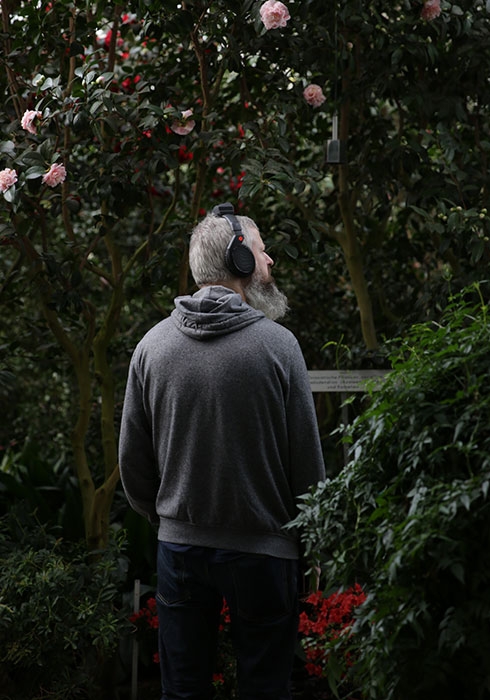As part of Berlin’s CTM Festival (for Adventurous Music and Art) the main tropical greenhouse of the botanical gardens was transformed into an immersive sound installation. The greenhouse itself is like a glass cathedral, a vast relic of Germany’s colonial history, and the parameters of the piece circumscribe a relatively small section of the site. Visitors are given headphones and instructed to move slowly. The headphones track your progress via a series of sensors placed among the plants, and the soundtrack corresponds with your location. In a side room filled with lush verdant foliage, where you can taste the moisture in the air, the headphones fill with the sound of rain. There are also voices and electronic pulses that beat a rhythm to the journey. Lucrecia Dalt is a Colombian music producer and pop surrealist who has made her home in Berlin and much of the sound that filters through the headphones feels like it could be heard on the dancefloors of the city’s more experimental clubs. And it is possible to dance with the piece – it is a fully responsive partner reacting to the motion of your body. Depending on the route you choose and the speed you move at, the fabric of the piece shifts, with forest sounds and voices fading in and out and overlapping.
The work combines this soundscape with a text-based element and is presented within the framework of the ‘Natur Nach Humboldt’ initiative celebrating the 250th anniversary of Alexander von Humboldt’s birth, the great naturalist and the man with more places and living things named after him than anyone else. Nomenclature, and more specifically, the imposing of western names on indigenous plants, is the central focus of the work. Brazilian artist Maria Thereza Alves has worked with the Guaraní people of the Jaguapiru Reservation in Dourados in Mato Grosso do Sul, Brazil, since 1980. Through her conversations with the local reservation leader Maximino Rodrigues and his community, the names of plants held in the garden’s collection were reclaimed and honoured, instead, with song lyrics as an act of liberation. They renamed what we know as Calathea Zebrina with the ode ‘Plant which died, taking with it the name of a painted animal’ (Rogue-pe pará ho’ysavy apere y’uhe’i). Inscribed into little red plaques that are placed throughout the plant beds, these evocative tributes convey alternative modes of relating to the natural world that the Latin names fail to communicate.
Entering the glasshouse wearing headphones is an encounter with technology and it is easy to forget that living species surround you. But tropical glasshouses recall another hangover from the colonial era – they are zoos for plants, purpose-built environments designed to simulate the conditions of another region. This work is an artificial experience within an artificial experience. Its power, however, stems from its ability to highlight the tension between the natural world as it truly exists and the natural world as it is codified, commodified, and delivered to us for our consumption.
Online exclusive published on 19 February 2020
